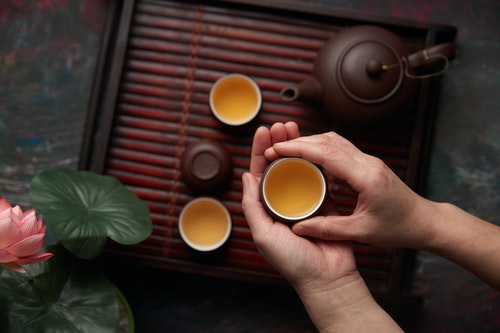
Green tea can be calming in smaller quantities. At the same time, the tea does contain caffeine and should be enjoyed in moderation.
My clients are focusing on their mental and emotional health more than ever before. And, they are well aware that their diet can contribute to their wellbeing. This is why I decided to research is green tea calming for people.
In this post, you will discover how green tea can help you to relax and understand the other neurological effects it can have on you. Let’s get started!
Contents
As mentioned, green tea can help to have a calming effect on you. This is thanks to an amino acid known as theanine. It can cross the blood-brain barrier and regular inhibitory neurotransmitters, serotonin, and dopamine in certain parts of the brain.
Another benefit of theanine, is that it has an impact on alpha brain waves, which are responsible for relaxation. In particular, theanine causes alpha waves to be generated on the occipital and parietal lobes of the brain. This induces relaxation without causing drowsiness.

There is some evidence that the theanine in the green tea can actually work to reduce some of the symptoms that are associated with anxiety. In addition to this, researchers also found that theanine was able to reduce stress as well and even boost your mood.
It should be noted that this experiment was run with theanine extract and not green tea. Extracts tend to be a more concentrated version and it is unlikely that a cup of green tea will have the same level. As such, the results may not be as noticeable when you are simply sipping green tea. Nevertheless, it should still help to ease some of your anxiety.
As you are probably aware, cortisol is a hormone that tends to be a good indicator for stress. This is because it activates various features and characteristics that causes your body to feel like it is in danger. Thus, it is good news that EGCG in green tea acts as an inhibitor to the enzyme that is responsible for the conversion of substances into cortisol.
In turn, this can help to lower the cortisol levels in the body. This means that the systems in your body will be less likely to behave as though they are in a traumatic situation. Therefore, you are sure to feel a lot better and perhaps enjoy an improved mood as well.
Now, green tea doesn’t just have an impact on cortisol, though. No, the polyphenols in the tea can actually have even more of a positive effect. In addition to lowering cortisol levels, the polyphenols boost norepinephrine and dopamine in the brain. These are neurotransmitters that are associated with a more positive mood.

Matcha does fall under the category of green tea. It is grown, harvested, and processed a little differently, but they also have a great deal of similarities. Based on this, it is only natural to wonder does matcha reduce stress as well?
Well, there is one study that shows that this may be the case. However, matcha does achieve this result in a slightly different way. Once consumed, matcha has an impact on mechanisms that active dopamine D1 and serotonin HT1A receptors. In doing so, there is a decrease in symptoms and behaviors that are associated with anxiety.
Is it possible for green tea to have an opposite effect on people? Can it make you more anxious? Well, green tea does contain caffeine which can sometimes exacerbate the symptoms of anxiety. There could be an increased risk with people who are genetically predisposed to anxiety or to those who are sensitive to caffeine.
This is why it is a good idea to always start off with just a single cup of green tea a day. If you don’t notice any adverse effects, then you can slowly increase your consumption but avoid drinking more than two or three cups a day. If there are any problems, lower your consumption accordingly.
If you are quite sensitive to caffeine but still want to enjoy the health benefits of green tea, you may want to consider decaf green tea. It contains caffeine but in a far lower quantity. It should be noted that the exact level can vary from one brand to another.

As it was stated above, green tea contains caffeine. Due to this, you may not want to drink it before you go to bed. Of course, for some people, caffeine doesn’t have as much of an impact. If this is the case for you, then green tea may not affect you in the same manner.
It is best to drink green tea in the morning and to limit your consumption to no more than two or three cups, depending on your reaction to caffeine. You should stop drinking the tea by late afternoon. This will ensure that there is plenty of time for caffeine to leave your system before your bedtime.
If you are quite sensitive to caffeine, though, it may take you far longer than with most people. In this case, it is best to cut off your supply in the morning. This way, there will be less of a risk of dealing with any side effects.
Well, the verdict is in – green tea can have a calming effect on you. It can help to reduce anxiety and the symptoms associated with the condition. At the same time, it may even lower cortisol levels and improve your overall stress response!
If you enjoyed this post, make sure to check out our other articles on Pinterest. From health benefits to recipes, we cover every imaginable topic for green tea. Go ahead and see what there is for you to learn today.
